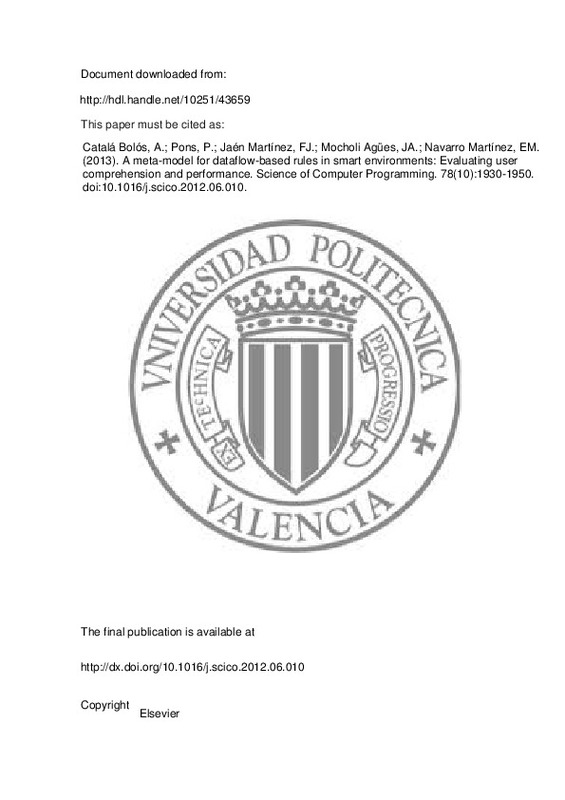JavaScript is disabled for your browser. Some features of this site may not work without it.
Buscar en RiuNet
Listar
Mi cuenta
Estadísticas
Ayuda RiuNet
Admin. UPV
A meta-model for dataflow-based rules in smart environments: Evaluating user comprehension and performance
Mostrar el registro sencillo del ítem
Ficheros en el ítem
| dc.contributor.author | Catalá Bolós, Alejandro
|
es_ES |
| dc.contributor.author | Pons, Patricia
|
es_ES |
| dc.contributor.author | Jaén Martínez, Francisco Javier
|
es_ES |
| dc.contributor.author | Mocholí Agües, Jose Antonio
|
es_ES |
| dc.contributor.author | Navarro Martínez, Elena María
|
es_ES |
| dc.date.accessioned | 2014-10-28T19:23:10Z | |
| dc.date.available | 2014-10-28T19:23:10Z | |
| dc.date.issued | 2013-10 | |
| dc.identifier.issn | 0167-6423 | |
| dc.identifier.uri | http://hdl.handle.net/10251/43659 | |
| dc.description | NOTICE: this is the author’s version of a work that was accepted for publication in Science of Computer Programming Changes resulting from the publishing process, such as peer review, editing, corrections, structural formatting, and other quality control mechanisms may not be reflected in this document. Changes may have been made to this work since it was submitted for publication. A definitive version was subsequently published in Science of Computer Programming, [Volume 78, Issue 10, 1 October 2013, Pages 1930–1950] DOI 10.1016/j.scico.2012.06.010 | es_ES |
| dc.description.abstract | A considerable part of the behavior in smart environments relies on event-driven and rule specification. Rules are the mechanism most often used to enable user customization of the environment. However, the expressiveness of the rules available to users in editing and other tools is usually either limited or the available rule editing interfaces are not designed for end-users with low skills in programming. This means we have to look for interaction techniques and new ways to define user customization rules. This paper describes a generic and flexible meta-model to support expressive rules enhanced with data flow expressions that will graphically support the definition of rules without writing code. An empirical study was conducted on the ease of understanding of the visual data flow expressions, which are the key elements in our rule proposal. The visual dataflow language was compared to its corresponding textual version in terms of comprehension and ease of learning by teenagers in exercises involving calculations, modifications, writing and detecting equivalences in expressions in both languages. Although the subjects had some previous experience in editing mathematical expressions on spreadsheets, the study found their performance with visual dataflows to be significantly better in calculation and modification exercises. This makes our dataflow approach a promising mechanism for expressing user-customized reactive behavior in Ambient Intelligence (AmI) environments. The performance of the rule matching processor was validated by means of two stress tests to ensure that the meta-model approach adopted would be able to scale up with the number of types and instances in the space. © 2012 Elsevier B.V. All rights reserved. | es_ES |
| dc.description.sponsorship | This work received financial support from the Spanish Ministry of Education under the National Strategic Program of Research and Project TSI2010-20488. Our thanks also go to the high school "Collegi Parroquial D. Jose Lluch - Alboraya", especially to the teachers and students that participated in the empirical study reported in this paper. A. Catala is supported by an FPU fellowship from the Ministry of Education of Spain with reference AP2006-00181. | en_EN |
| dc.language | Inglés | es_ES |
| dc.publisher | Elsevier | es_ES |
| dc.relation.ispartof | Science of Computer Programming | es_ES |
| dc.rights | Reserva de todos los derechos | es_ES |
| dc.subject | Ambient intelligence | es_ES |
| dc.subject | Customization | es_ES |
| dc.subject | Dataflow | es_ES |
| dc.subject | Event based | es_ES |
| dc.subject | Non-expert programmer | es_ES |
| dc.subject | Rule | es_ES |
| dc.subject | Smart home | es_ES |
| dc.subject | Visual language | es_ES |
| dc.subject.classification | LENGUAJES Y SISTEMAS INFORMATICOS | es_ES |
| dc.title | A meta-model for dataflow-based rules in smart environments: Evaluating user comprehension and performance | es_ES |
| dc.type | Artículo | es_ES |
| dc.identifier.doi | 10.1016/j.scico.2012.06.010 | |
| dc.relation.projectID | info:eu-repo/grantAgreement/MEC//AP2006-0181/ES/AP2006-0181/ | es_ES |
| dc.relation.projectID | info:eu-repo/grantAgreement/MICINN//TIN2010-20488/ES/CREATEWORLDS: UNA PLATAFORMA PARA EL APRENDIZAJE CREATIVO SOBRE MESAS INTERACTIVAS/ | es_ES |
| dc.rights.accessRights | Abierto | es_ES |
| dc.contributor.affiliation | Universitat Politècnica de València. Departamento de Sistemas Informáticos y Computación - Departament de Sistemes Informàtics i Computació | es_ES |
| dc.description.bibliographicCitation | Catalá Bolós, A.; Pons, P.; Jaén Martínez, FJ.; Mocholi Agües, JA.; Navarro Martínez, EM. (2013). A meta-model for dataflow-based rules in smart environments: Evaluating user comprehension and performance. Science of Computer Programming. 78(10):1930-1950. doi:10.1016/j.scico.2012.06.010 | es_ES |
| dc.description.accrualMethod | S | es_ES |
| dc.relation.publisherversion | http://dx.doi.org/10.1016/j.scico.2012.06.010 | es_ES |
| dc.description.upvformatpinicio | 1930 | es_ES |
| dc.description.upvformatpfin | 1950 | es_ES |
| dc.type.version | info:eu-repo/semantics/publishedVersion | es_ES |
| dc.description.volume | 78 | es_ES |
| dc.description.issue | 10 | es_ES |
| dc.relation.senia | 229989 |







![[Cerrado]](/themes/UPV/images/candado.png)

